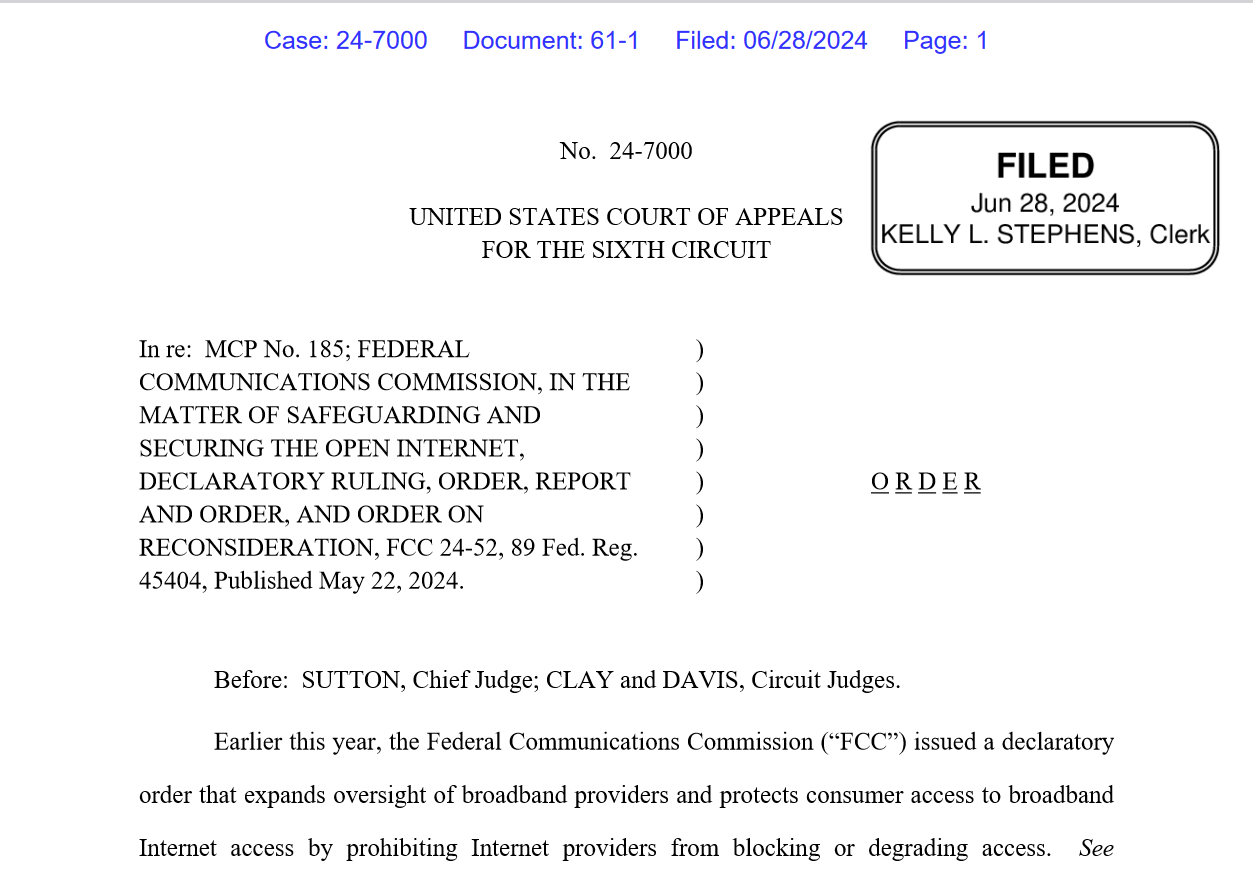
Net Neutrality
Ahead of a stay ruling, Sixth Circuit asks for briefs on impact of the demise of the Chevron Doctrine.

 Photo of Sixth Circuit Chief Judge Jeffrey Sutton from Duke University event post from 2018
Photo of Sixth Circuit Chief Judge Jeffrey Sutton from Duke University event post from 2018
WASHINGTON, June 28, 2024 – A federal court in Ohio said Friday it is keeping the net neutrality case, a procedural victory for internet service providers trying to block the rules from taking effect next month.
Earlier in June, the Federal Communications Commission asked the U.S. Court of Appeals for the Sixth Circuit in Cincinnati to transfer the case to the U.S. Court of Appeals for the D.C. Circuit in Washington, saying the latter tribunal had deeper experience with Net Neutrality litigation than the Sixth Circuit.
A three-judge panel of the Sixth Circuit said that the FCC’s reliance on the D.C. Circuit’s precedents wasn’t persuasive because of the agency’s inconsistent approach to classifying broadband internet access service within federal communications law over many years.
“The D.C. Circuit has some familiarity with the legal classification of broadband through its consideration of prior FCC orders. But the FCC’s vacillating positions on the proper classification of broadband demonstrate that the prior orders do not represent the staggered implementation of a single undertaking,” the Sixth Circuit panel said.
The unanimous ruling was handed down by Chief Judge Jeffrey Sutton, Circuit Judge Eric Clay, and Circuit Judge Stephanie Dawkins Davis. Sutton was appointed by President George W. Bush, Clay by President Bill Clinton and Davis by President Joe Biden.
The panel was assigned randomly from the court’s 16 active judges and its 13 judges who have taken senior status, said Sixth Circuit clerk Kelly Stephens.
The Sixth Circuit was chosen by lottery to hear the Net Neutrality case because 11 appeals had been filed in seven circuits.
“When considering a motion to transfer a multi-circuit petition, we give considerable weight to our selection in the lottery. That lottery system would not mean much if a party disappointed by the luck of the draw could transfer the case to its preferred forum,” the Sixth Circuit panel said.
In addition to opposing the FCC’s transfer motion, the broadband ISPs have asked the Sixth Circuit to stay the rules by July 15. The Sixth Circuit indicated it was on track to meet that deadline with a ruling.
The FCC’s net neutrality rules are scheduled to take effect on July 22.
Within the transfer denial order, the Sixth Circuit panel also directed all parties, including the FCC and the national and regional trade associations representing broadband Internet Service Providers, to file briefs addressing the impact of the Supreme Court’s Chevron Doctrine ruling handed down Friday morning on the Sixth Circuit’s “analysis of the stay motion.” The briefs are due no later than July 8.
In Loper Bright Enterprises v. Raimondo, the Supreme Court ruled 6-3 that the federal judiciary no longer had to defer to regulatory agencies in disputes over the correct reading of vague laws passed by Congress. The ruling overturned the deferential Chevron Doctrine adopted in 1984 in Chevron U.S.A., Inc. v. Natural Resources Defense Council, Inc.
In past Net Neutrality litigation, the FCC has relied on Chevron deference to keep broadband ISPs effectively deregulated or subject to common carrier regulation. The FCC’s new Net Neutrality rules adopted in April went with the common carrier approach, triggering the litigation initiated by trade groups for Comcast Corp., Charter Communications, AT&T and Verizon.

